商务英语谈判技巧
商务英语在贸易谈判中的应用技巧

商务英语在贸易谈判中的应用技巧1.熟悉行业术语:在贸易谈判中,双方经常使用行业专用术语,因此,了解并熟悉这些术语是非常重要的。
通过学习并运用这些术语,可以展示自己的专业知识,并且更好地理解对方的需求和要求。
2.准备好相关资料:在进行贸易谈判之前,准备好相关的文件和资料非常重要。
这些文件和资料可以包括市场研究报告、销售数据、产品目录、竞争分析等。
通过准备充分的资料,可以增加自己的信誉度,并且有助于推动谈判进展。
3.发掘共同利益:在谈判过程中,寻找并发掘双方的共同利益是非常重要的。
通过强调共同的目标和利益,可以促进合作,并帮助双方达成协议。
商务英语可以用来表达自己的意图和需求,并理解对方的意见和要求。
4.善于倾听:在贸易谈判中,善于倾听对方的意见和需求是至关重要的。
通过仔细倾听,可以更好地理解对方的立场,并发现共同点和折衷方案。
此外,通过倾听对方的观点,可以更好地回应对方的要求,增加谈判的成功几率。
5.使用适当的语言:商务英语在贸易谈判中的使用需要注意语言的适当性和礼貌性。
使用准确和明确的语言可以避免误解和歧义,同时,使用礼貌的语言可以增加双方的亲和力和合作性。
因此,在进行贸易谈判时,需要注意语言的选择和使用。
6.虚心提问和探索:在贸易谈判中,虚心提问和探索对方的需求和要求是非常重要的。
通过提问和探索,可以更好地了解对方的观点和意见,并通过回答对方的问题来展示自己的专业知识。
在提问和探索时,需要注意问题的适当性和开放性。
7.维持积极的态度:在贸易谈判中,维持积极的态度非常重要。
积极的态度可以帮助双方保持合作和谈判的动力,增加谈判的成功几率。
通过使用积极的语言和表达方式,可以展示自己的理解和合作意愿。
总而言之,商务英语在贸易谈判中是非常重要的。
通过运用商务英语的技巧和技巧,可以促进双方的理解和合作,减少误解和疑虑,并最终达成对双方都有利的交易协议。
成功的商务英语谈判技巧
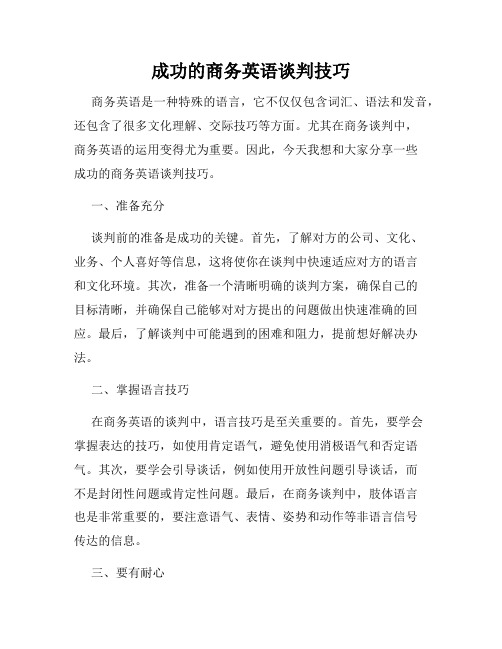
成功的商务英语谈判技巧商务英语是一种特殊的语言,它不仅仅包含词汇、语法和发音,还包含了很多文化理解、交际技巧等方面。
尤其在商务谈判中,商务英语的运用变得尤为重要。
因此,今天我想和大家分享一些成功的商务英语谈判技巧。
一、准备充分谈判前的准备是成功的关键。
首先,了解对方的公司、文化、业务、个人喜好等信息,这将使你在谈判中快速适应对方的语言和文化环境。
其次,准备一个清晰明确的谈判方案,确保自己的目标清晰,并确保自己能够对对方提出的问题做出快速准确的回应。
最后,了解谈判中可能遇到的困难和阻力,提前想好解决办法。
二、掌握语言技巧在商务英语的谈判中,语言技巧是至关重要的。
首先,要学会掌握表达的技巧,如使用肯定语气,避免使用消极语气和否定语气。
其次,要学会引导谈话,例如使用开放性问题引导谈话,而不是封闭性问题或肯定性问题。
最后,在商务谈判中,肢体语言也是非常重要的,要注意语气、表情、姿势和动作等非语言信号传达的信息。
三、要有耐心商务谈判中,很多时候是需要耐心等待的。
要想在谈判中取得成功,必须保持耐心和冷静的头脑。
遇到困难或挫折时,不要轻易妥协,要坚持自己的原则和目标。
同时,也要学会尊重对方的意见和建议,耐心听取对方的想法,这样更有可能在谈判中达成共识。
四、清晰明确的表达在商务英语谈判中,清晰明确的表达是相当重要的。
要注意谈判文本中的语言和语法,不要使用太复杂的语言,也避免使用模糊或不清晰的语言,特别是在表述条款或协议时。
如果不确定对方是否理解,可以再次说明,或简单地重复以确保双方都理解。
五、灵活应对在商务英语谈判中,准备充分很重要,但同样重要的是灵活应对。
如果遇到了完全出乎意料的情况,就需要适应环境变化,跟上对方的节奏。
要学会快速思考,并在适当的时候放弃一些目标,接受相对较小的收益。
只要是在整体谈判目标不受损失的情况下,这样做是符合利益最大化的。
六、善于发现共同点商务英语的谈判中,双方往往有各自的目标和利益,但是,如果能够发现共同点,就更有可能取得成功。
商务英语专业的国际会议与商务谈判技巧

商务英语专业的国际会议与商务谈判技巧商务英语专业培养学生的国际会议和商务谈判技能,使他们能够在跨国公司、国际组织或国际贸易方面取得成功。
在这篇文章中,将探讨商务英语专业的学生应掌握的国际会议与商务谈判技巧。
一、国际会议技巧国际会议是商务英语专业学生必备的沟通技巧之一。
以下是商务英语专业学生在国际会议中应该注意的几个技巧。
1. 梳理会议议程在参加国际会议之前,商务英语专业学生需要仔细梳理会议议程,并提前熟悉各项议题的背景和相关资料。
这样可以帮助他们在会议中做到心中有数,准备充分。
2. 有效演讲商务英语专业学生需要学会进行有效的演讲和表达。
他们应该练习清晰地陈述观点,使用简洁而准确的语言。
此外,他们还需要掌握一些演讲技巧,如语速、音调和肢体语言的运用。
3. 处理问题商务英语专业学生在国际会议中可能会面临各种问题和挑战。
他们需要学会冷静应对,不卑不亢地解答问题。
有效的沟通和协调能力是解决问题的关键。
二、商务谈判技巧商务英语专业学生也需要掌握商务谈判技巧,以便在跨国公司或国际贸易中取得成功。
1. 准备充分商务英语专业学生在商务谈判前应该进行充分的准备工作。
了解对方的背景和需求,收集相关信息,并制定自己的谈判策略。
准备充分可以提高他们的信心,使谈判更有胜算。
2. 谈判技巧商务英语专业学生需要熟练掌握一些谈判技巧,如积极倾听、善于提问以及灵活应变等。
他们还需要学会处理冲突和解决问题,力求达成共赢的商务合作关系。
3. 跨文化意识在国际商务谈判中,跨文化意识是非常重要的。
商务英语专业学生需要理解不同文化背景下的商务习惯和沟通方式,并做出相应的调整。
尊重和理解对方文化的差异可以有效地减少误解和冲突。
结论商务英语专业的国际会议与商务谈判技巧对于学生未来在跨国公司、国际组织或国际贸易方面的发展至关重要。
通过掌握国际会议技巧和商务谈判技巧,他们可以在国际舞台上展示自己的才能并取得成功。
因此,商务英语专业学生应该努力学习和实践这些技巧,为自己的未来铺就成功之路。
商务英语谈判技巧—要求优惠、给予优惠.doc

商务英语谈判技巧—要求优惠、给予优惠商务英语谈判技巧—要求优惠、给予优惠要求优惠1.We d like to ask for a reduction in price because of the big size of our order.鉴于我方的定货量很大,希望能降价。
2. Since the present market is so weak, you ll have to lower your price if you want us to increase sales.由于目前的市场不那么景气,如果贵方需要我方增加销售量的话,就必须降价。
3.Isn t it possible to give us a little more discount?难道就没有可能再多打一些折扣了吗?4. If you are prepared to give me some allowance, i ll consider placing an order for 10000 doze.如果你们愿意减价的话,我可以考虑订购10000打。
5. Should you be prepared to reduce your price, we might come to terns.如果贵方准备降价的话,我们也许就能成交。
6. If the order is substantial one, how much will you come down?如果订购数量相当大,你们可以降价多少?7. We invite quotation of the lowest price.我们恳请报出最低价。
8. May we suggest that you could perhaps make some allowance on your quoted prices?我们能建议贵方对所报价格打些折扣吗?9. If you reduce the price by 2%, I think we can do 20 MT.如果贵方降价2%的话,我认为我方可以购买20吨。
英语商务谈判技巧
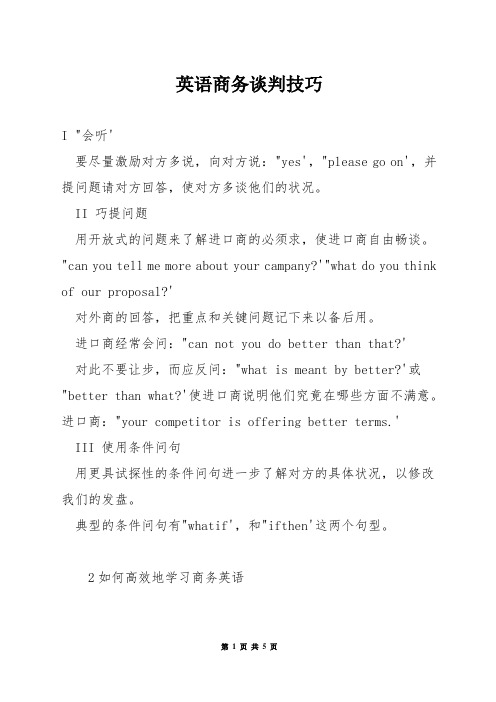
英语商务谈判技巧I "会听'要尽量激励对方多说,向对方说:"yes',"please go on',并提问题请对方回答,使对方多谈他们的状况。
II 巧提问题用开放式的问题来了解进口商的必须求,使进口商自由畅谈。
"can you tell me more about your campany?'"what do you think of our proposal?'对外商的回答,把重点和关键问题记下来以备后用。
进口商经常会问:"can not you do better than that?' 对此不要让步,而应反问:"what is meant by better?'或"better than what?'使进口商说明他们究竟在哪些方面不满意。
进口商:"your competitor is offering better terms.'III 使用条件问句用更具试探性的条件问句进一步了解对方的具体状况,以修改我们的发盘。
典型的条件问句有"whatif',和"ifthen'这两个句型。
2如何高效地学习商务英语提升英语语言能力当然是重中之重。
如何提升语言能力,这个是学英语的同学碰到的首要问题。
关于商务英语来说,听说尤为重要。
一些日常商务交流的场景要熟悉,常用的单词词组也要记住。
最好在校期间,可以和同学组成小组学习商务场景对话。
出来社会工作了你就知道,英语口语不过关的话,在面试第一轮就被刷掉了。
现实的状况是,很多同学考试可以得高分,英语笔译能力也不错,就是开口交流不流利,或者是纯粹的哑巴英语。
拓展知识面,通过学习和施行了解商务流程。
在校同学主要靠学校老师提供模拟场景的机会以及自己在假期找到实习的机会。
学商务英语的同学,一定要找到机会实习,理论和施行往往有一段距离。
国际贸易谈判中商务英语的沟通技巧分析

国际贸易谈判中商务英语的沟通技巧分析在国际贸易谈判中,商务英语是非常必要的。
商务英语的运用不仅体现了外商的语言能力,还彰显了谈判沟通的技巧。
本文将从以下几个方面进行分析:一、语速与语气在国际贸易谈判中,语速和语气很重要。
语速过快会让对方难以理解,感觉到被冲击。
语气过于强硬会令人感觉到压力过大,让谈判过程更加艰难。
因此,外商在谈判中要注意控制语速和语气,不要过于激动或急躁,保持中立、友善的态度是非常必要的。
二、表达技巧表达技巧是商务英语谈判中不可或缺的部分。
言简意赅,简洁明了的表达方式是大多数商人所倡导的。
用简单的词汇和语句来表达复杂的问题,以及准确翻译对方的表述,都是表达技巧中的一环。
同样,想要让自己的立场和观点被对方所理解,还需要注重节奏和重点,以提高对方接受自己观点的概率。
三、交流技巧在国际贸易谈判中,交流技巧是至关重要的。
首先,外商应该注重倾听对方的观点和需求,并且注意语言的细节,不要因为自己的执着而忽视谈判对方的感受。
此外,还要学会掌握转移话题的技巧,以在谈判过程中更容易达成共识。
而对于一些棘手的问题,外商应当注重细节,并以平和、合理的态度来沟通。
这样不仅可以帮助他们更好地理解问题,也会让自己更容易达成目标。
四、时间规划在谈判中要注意以时间为主导的规划,这样才能更好地控制整个谈判的进度。
外商应该事先对谈判议题进行整理,以及说明自己的谈判限制。
同时,也要尝试一些策略,例如提议定期性的会面或讨论,并在谈判过程中根据进展来调整自己的计划。
总之,商务英语的沟通技巧在国际贸易谈判中至关重要。
外商应该注意到所有的细节,以及如何更好地控制整个谈判的进程。
同时,还需要注重语速和语气、表达和交流技巧、时间规划等方面的技巧。
如果能够将这些技巧都充分运用到谈判中,那么外商的商业谈判一定会更加顺利和成功。
国际贸易谈判中商务英语的沟通技巧分析
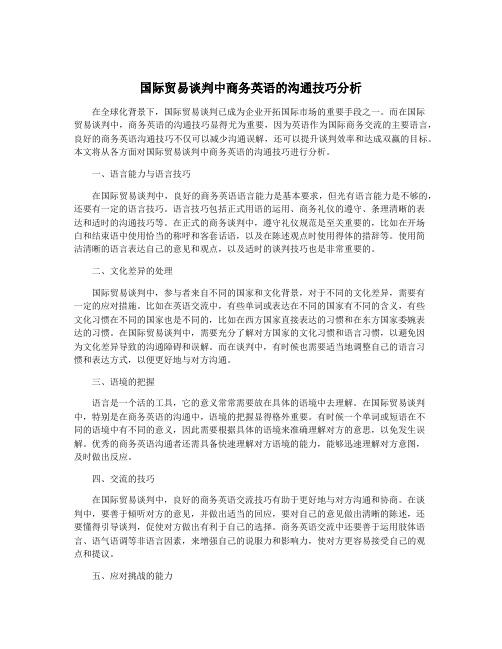
国际贸易谈判中商务英语的沟通技巧分析在全球化背景下,国际贸易谈判已成为企业开拓国际市场的重要手段之一。
而在国际贸易谈判中,商务英语的沟通技巧显得尤为重要,因为英语作为国际商务交流的主要语言,良好的商务英语沟通技巧不仅可以减少沟通误解,还可以提升谈判效率和达成双赢的目标。
本文将从各方面对国际贸易谈判中商务英语的沟通技巧进行分析。
一、语言能力与语言技巧在国际贸易谈判中,良好的商务英语语言能力是基本要求,但光有语言能力是不够的,还要有一定的语言技巧。
语言技巧包括正式用语的运用、商务礼仪的遵守、条理清晰的表达和适时的沟通技巧等。
在正式的商务谈判中,遵守礼仪规范是至关重要的,比如在开场白和结束语中使用恰当的称呼和客套话语,以及在陈述观点时使用得体的措辞等。
使用简洁清晰的语言表达自己的意见和观点,以及适时的谈判技巧也是非常重要的。
二、文化差异的处理国际贸易谈判中,参与者来自不同的国家和文化背景,对于不同的文化差异,需要有一定的应对措施。
比如在英语交流中,有些单词或表达在不同的国家有不同的含义,有些文化习惯在不同的国家也是不同的,比如在西方国家直接表达的习惯和在东方国家委婉表达的习惯。
在国际贸易谈判中,需要充分了解对方国家的文化习惯和语言习惯,以避免因为文化差异导致的沟通障碍和误解。
而在谈判中,有时候也需要适当地调整自己的语言习惯和表达方式,以便更好地与对方沟通。
三、语境的把握语言是一个活的工具,它的意义常常需要放在具体的语境中去理解。
在国际贸易谈判中,特别是在商务英语的沟通中,语境的把握显得格外重要。
有时候一个单词或短语在不同的语境中有不同的意义,因此需要根据具体的语境来准确理解对方的意思,以免发生误解。
优秀的商务英语沟通者还需具备快速理解对方语境的能力,能够迅速理解对方意图,及时做出反应。
四、交流的技巧在国际贸易谈判中,良好的商务英语交流技巧有助于更好地与对方沟通和协商。
在谈判中,要善于倾听对方的意见,并做出适当的回应,要对自己的意见做出清晰的陈述,还要懂得引导谈判,促使对方做出有利于自己的选择。
商务英语在贸易谈判中的应用技巧

商务英语在贸易谈判中的应用技巧在国际贸易谈判中,商务英语的应用技巧对于成功达成协议至关重要。
以下是在贸易谈判中应用商务英语的八个技巧:1.了解市场在进行贸易谈判之前,必须对当前市场情况和竞争对手有深入的了解。
这有助于为谈判提供有力的依据,确保在谈判中取得优势。
2.准备充分谈判前的准备工作至关重要。
需要仔细研究对方公司的背景、业务范围、产品特点等信息,并针对这些信息制定出有效的谈判策略。
3.建立信任建立信任是贸易谈判成功的关键。
在谈判过程中,应注重表达诚意和透明度,与对方建立良好的沟通和信任关系。
4.明确目标在谈判前,需要明确自己的目标和底线,并制定出实现这些目标的策略和计划。
这有助于在谈判中保持清醒头脑,不被对方所迷惑。
5.灵活应对在谈判中,可能会出现预料之外的情况和变化。
这时需要灵活应对,根据实际情况调整策略,以达成最佳的谈判结果。
6.保持耐心贸易谈判往往需要经过长时间的拉锯和磨合。
在谈判过程中,需要保持耐心,不轻易妥协或放弃,坚持到底以达成目标。
7.善用语言商务英语是贸易谈判的通用语言。
需要熟练掌握商务英语的表达和沟通技巧,善用语言工具,提高谈判效率。
8.倾听优先倾听对方的意见和需求是至关重要的。
在谈判中,需要先倾听对方的需求和关切,再表达自己的观点和要求,以避免沟通障碍和误解。
总结:以上是商务英语在贸易谈判中的应用技巧,掌握这些技巧能够提高谈判效率和质量,有效维护自身利益并达成双赢的结果。
在实际谈判中,需要结合具体情况灵活运用这些技巧,以达到最佳的谈判效果。
商务英语共赢谈判技巧

商务英语共赢谈判技巧
商务英语共赢谈判技巧包括以下几点:
充分准备:在谈判前,要了解谈判的背景、目的、利益和对手的情况。
同时,要明确自己的目标和底线,并制定相应的策略。
建立良好的关系:在谈判中,要与对手建立互信和友好的关系,避免情绪化或对立。
同时,要关注对方的利益,寻求共同点,并表达出合作的意愿。
倾听和表达:在谈判中,要认真倾听对方的意见和需求,并表达自己的观点和需求。
同时,要避免攻击或指责对方,而是寻求共识和解决方案。
灵活变通:在谈判中,要根据实际情况和对方的变化,灵活调整自己的策略和方案。
同时,要学会妥协和让步,以达成双方都能接受的协议。
掌握语言技巧:在谈判中,要使用准确、清晰、礼貌的语言,避免模糊或歧义。
同时,要善于运用语气、语调和表情等非语言手段来增强表达效果。
遵守法律法规:在谈判中,要遵守相关法律法规和商业道德规范。
同时,要了解对方的法律和文化背景,避免产生误解或冲突。
达成双赢协议:在谈判中,要寻求双方的共同利益和合作机会,达成双赢的协议。
同时,要评估协议的可行性和长期效益,以确保合作的成功和持续发展。
通过掌握这些商务英语共赢谈判技巧,可以更好地与对手沟通交流,达成双方都能接受的协议,实现商业合作的目标。
商务英语在国际贸易谈判中的应用技巧和注意点

商务英语在国际贸易谈判中的应用技巧和注意点在国际贸易谈判中运用商务英语的应用技巧和注意点非常重要。
下面是一些值得注意的方面:1.语言技巧在国际贸易谈判中,语言技巧是一个非常重要的因素。
首先,要注意口语表达的清晰度和准确性,用简单明了的语言表达自己的观点和意思。
同时,要注意避免使用过于复杂或难以理解的词汇和语法结构,以免造成误解或困惑。
其次,要善于运用修饰性语言,以增强说话者的说服力。
使用形容词和副词来描述产品的优势和特点,以及公司的实力和专业知识。
此外,使用肯定语言的技巧也很重要,例如使用“我们可以考虑”、“我们同意”的表达方式,而不是直接和坚决的说“不”。
最后,要注意对语言的灵活运用。
在国际贸易谈判中,对方可能会使用不同的语言风格和习惯,因此要根据谈判对象的需求和偏好适当调整自己的语言风格。
同时,要善于使用比喻和非语言的表达方式,如图表和图像,以便更好地传达和理解重要信息。
2.文化差异的意识在国际贸易谈判中,文化差异是一个不可忽视的因素。
每个国家和地区都有不同的文化背景和价值观,因此要对谈判对象的文化背景进行了解,并尊重和适应对方的文化差异。
例如,在一些亚洲国家,人们更注重团队精神和社会关系,因此在谈判中要多注意团队合作和人际关系的建立。
此外,还要注意语言和行为上的文化差异。
例如,在一些西方国家,直接表达和明确陈述观点被视为有效和诚实的方式,而在一些亚洲国家,圆滑和委婉的表达更受人们的欢迎。
因此,对不同国家和地区的文化差异要有深入的了解,并在谈判中予以适当的尊重和表达。
3.谈判技巧在国际贸易谈判中,运用一些谈判技巧能够更好地达到谈判目标。
首先,要善于倾听并理解对方的观点和意见。
通过倾听,可以更好地了解对方的需求和利益,并更有针对性地提出合理的建议和解决方案。
其次,要善于提出有说服力的论点。
通过提供可靠的数据和信息来支持自己的观点,并与对方一起寻找共同利益和解决问题的方式。
此外,要善于利用妥协和折中的方式来达到双方共赢的结果。
国际商务英语谈判技巧

国际商务英语谈判技巧第一,提问技巧。
在商务英语谈判中,提问技巧是至关重要的,用正式的英语语句进行提问不仅可以证实我们的推断,还可以获得平常无法获得的知识。
第二,运用婉转语言。
在商务英语谈判中,有些语言是正确的,但是效果令人难以接受,最终无法使双方满意。
婉转的语言正如一句话"言有尽而意无穷,余意尽在不言中',比如:I agree with most of what you said,换句话是there are something in what you said that I not agree with. 这是一种婉转表达否定的意思。
第三,用条件句代替"NO'。
在谈判中,如果想表示否定的意思,不要直接说"NO',如果说了会让对方感到尴尬,谈判进程甚至会因此陷入僵局。
一方可以用条件句询问对方Would you be willing to meet the extra cost if we meet your additional requirements ?2商务英语谈判怎么学习第一,善于倾听,做到少说多听。
商务谈判实际上是一种对话,在这个对话中,双方说明自己的状况,陈述自己的观点,倾听对方的提案、发盘、并做反提案,还盘、互相让步,最后达成协议。
第二,灵活应变,做到灵活性与原则性相结合。
商务谈判过程中往往会碰到一些意想不到的尴尬事情,要求谈判者具有灵活的语言应变能力,与应急手段相联系,巧妙地摆脱困境。
第三,语义清楚,做到形式委婉、内容明确。
国际商务谈判大多用英语进行,而谈判双方的母语往往又不都是英语,这就增加了交流的难度。
在这种状况下,我们要尽量用简单、清楚、明确的英语,不要用易引起误会的多义词、双关语、俚语、成语。
3国际商务英语谈判技巧试探摸底法没有调查就没有发言权,在商务谈判中,首先要摸清对方的意图、底牌或大概底线在谈判中才干有的放矢,古语有云:知彼知己百战百胜。
国际贸易谈判中商务英语的沟通技巧分析

国际贸易谈判中商务英语的沟通技巧分析在全球化的今天,国际贸易谈判中商务英语的沟通技巧显得尤为重要。
商务英语是指在商业领域中使用的英语,它包括了商业活动中的采购、销售、谈判、合同、付款等方方面面,因此在国际贸易谈判中,良好的商务英语沟通技巧是至关重要的。
下面将从几个方面分析国际贸易谈判中商务英语沟通技巧的重要性及要点。
1. 语言表达的准确性在国际贸易谈判中,准确的语言表达尤为重要。
因为在商务领域中,一句话的语言表达不准确可能导致一笔生意的失败或者合作关系的破裂。
在国际贸易谈判中,参与者需要尽量避免使用模糊不清的词语和语言表达,尽量使用准确、清晰的商务英语进行沟通。
对于交易中的条款和条件,也需要进行准确的语言表达以避免产生歧义,在合同中明确条款和条件,避免双方之间出现误解。
2. 适当的语言礼仪在国际贸易谈判中,适当的语言礼仪也是非常重要的。
参与国际贸易谈判的商务人士需要懂得在商务场合中使用得体的语言,用词得体,礼貌用语恰当,以显示出自己的专业素质和商务礼仪。
在商务英语中,使用礼貌用语是至关重要的,比如“请”、“谢谢”、“不好意思”,这些礼貌用语能够显示出商务人士的尊重和关心,促进双方谈判的进行。
使用适当的称呼,比如“Mr.”、“Ms.”,也是非常重要的,尊重对方的称呼能够给对方良好的印象。
3. 有效的沟通技巧国际贸易谈判中,有效的沟通技巧能够帮助商务人士更好地表达自己的意图,并且更好地理解对方的意图。
在商务英语中,使用一些疑问句和引导句能够帮助商务人士更好地了解对方的立场和需求,从而更好地进行谈判。
适当的表达自己的立场和意见也是非常重要的,比如使用条件句、虚拟语气等,能够更好地表达自己的要求和期望,同时也能够使对方更好地理解。
在国际贸易谈判中,商务人士需要尽量避免使用歧义的词语和句子,同时积极主动地向对方询问问题以及阐明自己的观点。
4. 文化意识的重要性国际贸易涉及到不同国家、不同地区的商务人士之间的交流,而不同的文化背景会影响到人们的思维方式、交流方式、行为习惯等。
商务谈判技巧英文版(共3篇)(精简版)
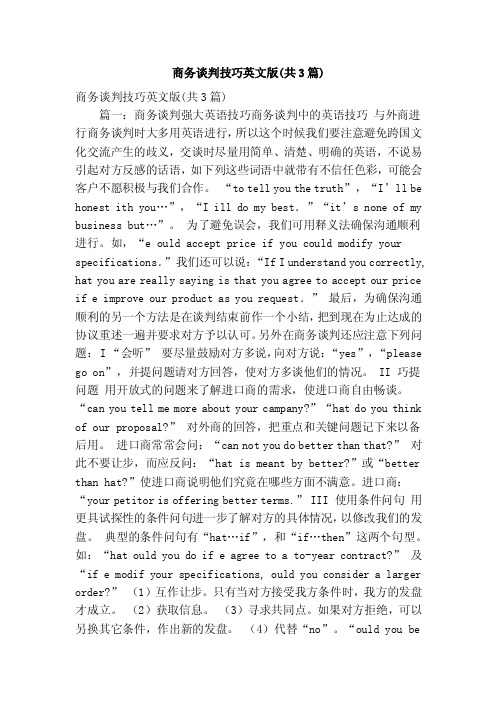
商务谈判技巧英文版(共3篇)商务谈判技巧英文版(共3篇)篇一:商务谈判强大英语技巧商务谈判中的英语技巧与外商进行商务谈判时大多用英语进行,所以这个时候我们要注意避免跨国文化交流产生的歧义,交谈时尽量用简单、清楚、明确的英语,不说易引起对方反感的话语,如下列这些词语中就带有不信任色彩,可能会客户不愿积极与我们合作。
“to tell you the truth”,“I’ll be honest ith you…”,“I ill do my best.”“it’s none of my business but…”。
为了避免误会,我们可用释义法确保沟通顺利进行。
如,“e ould accept price if you could modify your specifications.”我们还可以说:“If I understand you correctly, hat you are really saying is that you agree to accept our price if e improve our product as you request.” 最后,为确保沟通顺利的另一个方法是在谈判结束前作一个小结,把到现在为止达成的协议重述一遍并要求对方予以认可。
另外在商务谈判还应注意下列问题:I “会听” 要尽量鼓励对方多说,向对方说:“yes”,“please go on”,并提问题请对方回答,使对方多谈他们的情况。
II 巧提问题用开放式的问题来了解进口商的需求,使进口商自由畅谈。
“can you tell me more about your campany?”“hat do you think of our proposal?” 对外商的回答,把重点和关键问题记下来以备后用。
进口商常常会问:“can not you do better than that?” 对此不要让步,而应反问:“hat is meant by better?”或“better than hat?”使进口商说明他们究竟在哪些方面不满意。
商务英语谈判的语用策略解析
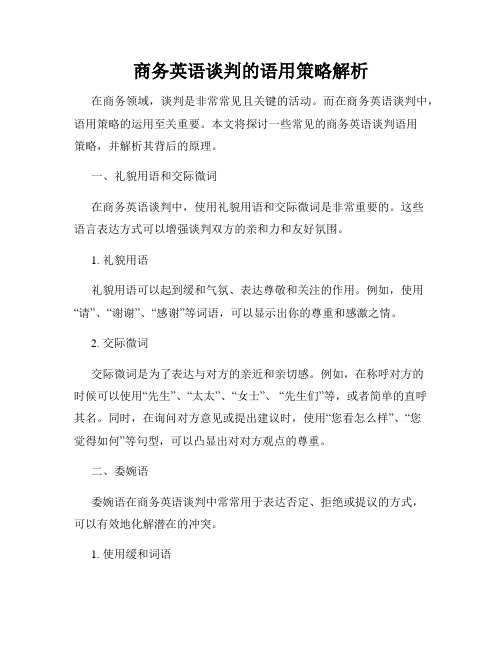
商务英语谈判的语用策略解析在商务领域,谈判是非常常见且关键的活动。
而在商务英语谈判中,语用策略的运用至关重要。
本文将探讨一些常见的商务英语谈判语用策略,并解析其背后的原理。
一、礼貌用语和交际微词在商务英语谈判中,使用礼貌用语和交际微词是非常重要的。
这些语言表达方式可以增强谈判双方的亲和力和友好氛围。
1. 礼貌用语礼貌用语可以起到缓和气氛、表达尊敬和关注的作用。
例如,使用“请”、“谢谢”、“感谢”等词语,可以显示出你的尊重和感激之情。
2. 交际微词交际微词是为了表达与对方的亲近和亲切感。
例如,在称呼对方的时候可以使用“先生”、“太太”、“女士”、“先生们”等,或者简单的直呼其名。
同时,在询问对方意见或提出建议时,使用“您看怎么样”、“您觉得如何”等句型,可以凸显出对对方观点的尊重。
二、委婉语委婉语在商务英语谈判中常常用于表达否定、拒绝或提议的方式,可以有效地化解潜在的冲突。
1. 使用缓和词语使用缓和词语可以减轻直接表达带来的压力。
例如,在拒绝对方提议时,可以使用“或许”、“也许”等词语来降低直接拒绝的程度,同时表达自己的立场。
2. 提出建议的委婉方式对于对方的提议,如果你有不同的意见,可以采用委婉的方式表达。
例如,可以使用“我理解您的观点,但是我认为…”、“或许我们可以考虑…”等句型,来表达自己的反对或者提议。
三、肯定语和赞美之词在商务英语谈判中,使用肯定语和赞美之词可以提升对方的自信心,并创造更好的谈判氛围。
1. 肯定对方观点当对方提出观点时,可以使用肯定语来表达自己的认同和尊重。
例如,使用“您的观点非常有见地”、“我完全同意您的观点”等句型,可以让对方感到被重视,并增强合作的意愿。
2. 表达赞美适当地表达赞美可以增加对方的信任和好感。
例如,在对方取得一定成就或者提出创新建议时,可以使用“恭喜”、“了不起”等表达方式,来表达对方的努力和智慧。
四、修辞手法在商务英语谈判中,使用一些修辞手法可以使言辞更加有说服力和有人情味,增加谈判效果。
国际贸易谈判中商务英语的沟通技巧分析

国际贸易谈判中商务英语的沟通技巧分析随着全球化的发展,国际贸易谈判变得越来越重要。
在国际贸易谈判中,商务英语的使用成为了必不可少的一部分。
在处理国际贸易谈判时,良好的商务英语沟通技巧是非常重要的。
本文将分析在国际贸易谈判中使用商务英语的沟通技巧,并提供一些相关建议。
一、语言表达要清晰明了在国际贸易谈判中使用商务英语时,首要的一点是语言表达要清晰明了。
由于双方使用的母语不同,可能会存在一些语言交流上的障碍。
在交流过程中,要尽量避免使用过于复杂的词汇和句子结构,尽量使用简单明了的语言表达。
同时要确保自己的发音准确,语速适中,这样可以更好地被对方理解。
建议:在准备国际贸易谈判前,可以针对常用的商务英语进行大量的练习,提升自己的口语表达能力。
可以尝试和一些以英语为母语的人进行交流练习,这样可以更好地适应国际贸易谈判中的语言环境。
二、尊重对方文化差异在国际贸易谈判中,涉及到不同国家的商务活动,因此对方可能会存在一定的文化差异。
在使用商务英语进行沟通时,需要尊重对方的文化差异,避免使用具有侮辱性或歧视性的语言表达。
尊重对方文化差异不仅可以促进双方的友好交流,还可以提升双方的信任感,从而更有利于谈判的进行。
建议:在进行国际贸易谈判前,可以对对方国家的文化进行一定的了解和学习。
了解对方国家的一些文化习俗和礼节,可以帮助我们更好地与对方进行交流,避免因文化差异造成的不必要的交流问题。
三、结构清晰的商务英语表达在国际贸易谈判中,商务英语的表达要求结构清晰,逻辑性强。
为了使对方更好地理解我们的想法和意图,要求我们在商务英语的表达中要遵循一定的逻辑结构。
先提出观点,然后逐步展开论述,最后得出结论。
这样的商务英语表达结构更有助于对方理解我们的意图。
四、适时的提问和回答在国际贸易谈判中,适时的提问和回答是非常重要的。
通过提问可以更深入地了解对方的意图,也可以更好地表达自己的观点和诉求。
在回答对方的问题时,要尽量直接明了地回答对方的问题,避免拐弯抹角。
成功的商务英语谈判技巧
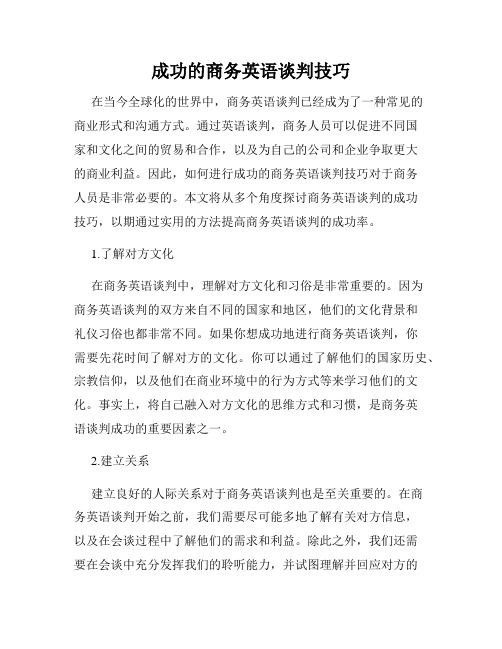
成功的商务英语谈判技巧在当今全球化的世界中,商务英语谈判已经成为了一种常见的商业形式和沟通方式。
通过英语谈判,商务人员可以促进不同国家和文化之间的贸易和合作,以及为自己的公司和企业争取更大的商业利益。
因此,如何进行成功的商务英语谈判技巧对于商务人员是非常必要的。
本文将从多个角度探讨商务英语谈判的成功技巧,以期通过实用的方法提高商务英语谈判的成功率。
1.了解对方文化在商务英语谈判中,理解对方文化和习俗是非常重要的。
因为商务英语谈判的双方来自不同的国家和地区,他们的文化背景和礼仪习俗也都非常不同。
如果你想成功地进行商务英语谈判,你需要先花时间了解对方的文化。
你可以通过了解他们的国家历史、宗教信仰,以及他们在商业环境中的行为方式等来学习他们的文化。
事实上,将自己融入对方文化的思维方式和习惯,是商务英语谈判成功的重要因素之一。
2.建立关系建立良好的人际关系对于商务英语谈判也是至关重要的。
在商务英语谈判开始之前,我们需要尽可能多地了解有关对方信息,以及在会谈过程中了解他们的需求和利益。
除此之外,我们还需要在会谈中充分发挥我们的聆听能力,并试图理解并回应对方的话语。
此外,我们还可以通过分享一个愉快、放松和互相尊重的氛围来建立良好的人际关系。
通过这样的方式,我们可以在商务英语谈判中取得更好的成果。
3.准备充分在商务英语谈判中,准备充分是相当必要的。
在会谈之前,我们应该充分了解产品、服务或合作环境,并对对方的需求和偏好进行仔细分析。
我们还需要了解自己公司的优劣势,确定我们的底线和行动计划。
此外,我们需要对可能会出现的问题和对方可能提出的问题进行预测和准备。
4.用简单的英语进行沟通在商务英语谈判中,用简单的英语进行沟通也是必不可少的。
尽管我们已经可以使用高级词汇和复杂的语法结构来表达意思,但在谈判中使用简单的英语能够更有利于我们与对方建立互信关系。
在谈判中使用简单的英语还有助于我们向对方明确我们的诉求和意见、避免产生误解。
商务英语谈判技巧

商务英语谈判技巧谈判中有时仅靠以理服人,以情动人是不够的,毕竟双方最关心的是切身利益,断然拒绝会激怒对方,甚至交易终止。
商务英语谈判技巧有哪些?下面店铺整理了商务英语谈判技巧,供你阅读参考。
商务英语谈判技巧:谈判对话Dialogue 1A: Is there any way you can cut us a better deal on your wholesale price for this order?B: We did the best that we could to give you a low price. Did you get our latest estimate?A: Based on the estimate you gave us, by the time we figure in transportation and other expenses, our profit is shot. With the offer you’ve given us, we’re making next to nothing. Can’t you do any better?B: I’ve already given you a discount of 20% off of what we normally charge… if I go any lower, we’ll have loss on the project.I really want to work with you on this, but we’ve already gone as low as we could go.A: To be honest… Our budgeted cost can’t exceed more than $150 dollars per unit. That’s our bottom line. If you can meet that price, you will get a deal. Otherwise…B: I’ll say that… I’ll go over the numbers again with our fina ncial team and see what I can do. I can’t give you any guarantees, but I’ll try.Dialogue 2A: You’ve got the email with all the specifications for the project from us, we’ll be accepting bids until noon on Tuesday, if you have any questions in the meantim e, please let me know…B: Actually, I do have a question. We’d like to know whatyou had in mind for a budget on this project. We’re hoping to put together a really competitive bid, but at the same time, we’d like to hit your target price too.A: I understand, but unfortunately it is our policy not to disclose our bottom line. You can be assured that price is a weighty consideration when we review the proposals, but we also take other elements into consideration, including design and practicality. We also give weight to the reputation of the submitting company.B: Do you have any price range? Is there any way you can give me some ideas of which direction to go, or how high is too high?A: We are just looking for a reasonable price according to the specificat ions in our project blueprint. That’s all I can say.安格英语老师认为学会迂回是谈判中非常重要的一项技能,而选择何时亮出自己的底线也需要大家在职场中多年的实践和学习才能够灵活地掌握。
商务英语谈判策略

商务英语谈判策略随着全球经济一体化的迅猛发展,跨国商务在经济活动中的地位日益突出,因而商务英语逐渐受到重视。
商务英语谈判策略有哪些?下面店铺整理了商务英语谈判策略,供你阅读参考。
商务英语谈判策略一、礼貌得体策略在不同的文化中,礼貌因素的考虑是一个普遍现象。
人们在交际中一般都希望对方遵守礼貌原则,说话时应多给别人一点方便,同时反过来获得对方对自己的好感。
在商务英语谈判中,语言表达要做到不卑不亢,得体脱俗,既要尊重国际贸易习惯,又要维护本国或本公司利益。
礼貌得体指的是减少表达有损于他人的观点,尽量少让别人吃亏,尽量多使别人受益。
在交际活动中,人们希望自己的形象和个性得到保持,希望自己的言论、思想和行动得到肯定和赞赏。
礼貌在维护和谐的人际关系中起着积极的作用。
但得体的语言受社会因素制约,语言的礼貌程度也同样受到社会因素的制约。
礼貌得体强调说话要看对象,要注意言行的时间和场合,也要注意言行的表达和效果,要恰到好处。
太随便的言语就会冒犯他人,过于有礼则让人感到虚伪。
在跨国商务英语谈判中,得体地使用语言必须考虑到社会因素。
在这一场合是礼貌的语言,换在另一场合就未必是。
其礼貌程度或显太高,或显太低,很容易使对方产生歧义。
例如,直截了当地对一位德国商人说话很可能是成功的,但如果对一位日本商人那样则可能是失败的,因为直率的语气对日本人来说十分不得体。
在跨国商务英语谈判中,要得体地使用语言,要尽量避免以下几种情况:(1)过度谦卑的口气。
如:We are extremely and sincerely sorry for the error and ask that you accept our humble and sincere apology for the undue inconvenience suffered by you. 在商务谈判中,一定的谦恭是必要的,但过于有礼则让人感到虚伪或使对方反感。
(2)贬低的口气。
商务英语谈判技巧—要求优惠、给予优惠

商务英语谈判技巧—要求优惠、给予优惠下面是店铺整理的商务英语谈判技巧,欢迎大家阅读!要求优惠1.We’d like to ask for a reduction in price because of the big size of our order.鉴于我方的定货量很大,希望能降价。
2. Since the present market is so weak, you’ll have to lower your price if you want us to increase sales.由于目前的市场不那么景气,如果贵方需要我方增加销售量的话,就必须降价。
3.Isn’t it possible to give us a little more discount?难道就没有可能再多打一些折扣了吗?4. If you are prepared to give me some al lowance, i’ll consider placing an order for 10000 doze.如果你们愿意减价的话,我可以考虑订购10000打。
5. Should you be prepared to reduce your price, we might come to terns.如果贵方准备降价的话,我们也许就能成交。
6. If the order is substantial one, how much will you come down?如果订购数量相当大,你们可以降价多少?7. We invite quotation of the lowest price.我们恳请报出最低价。
8. May we suggest that you could perhaps make some allowance on your quoted prices?我们能建议贵方对所报价格打些折扣吗?9. If you reduce the price by 2%, I think we can do 20 MT.如果贵方降价2%的话,我认为我方可以购买20吨。
商务英语沟通技巧

商务英语沟通技巧
商务英语沟通技巧包括但不限于以下方面:
1. 充分准备:在与商务伙伴进行英语沟通之前,充分准备是非常重要的。
这包括了解对方的文化、背景和语言习惯,以便更好地理解和沟通。
2. 建立良好的关系:在商务英语沟通中,建立良好的关系非常重要。
要尽可能地与对方建立信任和友好关系,这有助于促进有效的沟通。
3. 清晰明了的表达:使用简单明了的语言进行沟通是商务英语的关键。
避免使用过于复杂或难以理解的词汇和句子结构。
4. 倾听和理解:在商务英语沟通中,倾听和理解对方是非常重要的。
要尽可能地理解对方的观点和需求,并尽可能地回应他们的需求。
5. 确认和澄清:在商务英语沟通中,确认和澄清是非常重要的。
要确保自己完全理解对方的意思,可以通过问问题或重述来确认。
6. 保持专业和礼貌:在商务英语沟通中,保持专业和礼貌是非常重要的。
要使用礼貌的语言,避免过于直接或粗鲁的表达方式。
7. 适应和尊重文化差异:商务英语沟通通常涉及不同文化之间的交流,因此适应和尊重文化差异是非常重要的。
要尽可能了解对方的文化和价值观,并尝试在沟通中体现出来。
8. 学习和实践:不断学习和实践是提高商务英语沟通技巧的关键。
可以通过阅读、参加培训、与不同的人交流等方式来提高自己的商务英语沟通技巧。
希望以上技巧能对你有所帮助。
- 1、下载文档前请自行甄别文档内容的完整性,平台不提供额外的编辑、内容补充、找答案等附加服务。
- 2、"仅部分预览"的文档,不可在线预览部分如存在完整性等问题,可反馈申请退款(可完整预览的文档不适用该条件!)。
- 3、如文档侵犯您的权益,请联系客服反馈,我们会尽快为您处理(人工客服工作时间:9:00-18:30)。
Business Negotiation Skills in English(商务英语谈判技巧)Phases of NegotiationAccording to Robert Maddux, author of Successful Negotiation, negotiation is the process we use to satisfy our needs when someone else controls what we want、In business negotiations, the two parties endeavor to obtain their business goals through bargaining with their counterparts、Business negotiations are conducted in the following four phases: the preparation phase, opening phase, bargaining phase and closing phase、Preparation phase1.Choosing your teamThe negotiation team should include members in the following areas:✓mercial: responsible for the negotiation on price, delivery terms, and mercial policy of risk taking、✓Technical: responsible for specifications, programs, and methods of work、✓Financial: terms of payment, credit insurance and financial guarantees、✓Legal: contract documents, terms and conditions of contract, insurance and legal interpretation、✓Interpreter: familiar with the foreign language needed as well as the negotiationrelated knowledge, and having certain munication skills、The most important role in the team is the chief negotiator (CN), who is supposed to possess the following qualities: sociability, shrewdness, adaptability, patience, endurance、Other than that, extensive knowledge, clear oral expression as well as strong leadership are also important for a CN、2、Gathering and analyzing informationValuable information covers the areas in political, legal as well as business system, market research, financial policies, infrastructure and logistics、The knowledge on the counterpart is also necessary、With the information at hand, it is time do a feasibility study to adjust our goals to be achieved、3、The negotiation planThe plan defines the negotiating objectives, sets the minimum acceptable level for each term, and states the time control, initial strategy, the tactics and others including the location, personnel and facilities needed、A welldesigned plan allows more flexibility in different situations and guides the negotiators through the negotiation process without getting off track、The opening phaseIt is mon that the seller submits proposals、Then the buyer confronts with three options: outright acceptance, outright rejection, and qualified rejection, the last of which is usually the most choice、Once the positions and objectives of both parties are revealed, the negotiators begin to reflect both on the loss they will suffer if they would concede and on the loss they will receive if they would refuse to concede、The bargaining phaseAt this stage, concessions are made and advantages are gained, thus an agreement is to be achieved、Necessarily the team should make a reappraisal of the other party’s concession factor、If the other party concedes more/faster than expected, their real concession factor is greater、Adversely, if the other party concedes less/slower than expected, they are perhaps correct in estimation, or they are simply bluffing、As the negotiation moves to the stage of identifying particular concession exchanges, the negotiators will expect to receive signals which indicate the genuine positions、The closing phaseOnce the seller and the buyer reach an agreement, it is time to draw up the contract、Typically one party prepares the contract listing the agreed upon clauses、The other party makes amendments to the wording to make them more closely reflect the agreement、Negotiation Strategies and TacticsNegotiation strategies and tactics are crucial to business negotiation、Generally speaking, strategy may be defined as the overall plan used to gain advantage over the opponent or achieve some end、Tactics may be defined as the means by which the strategic objective is achieved、Once a strategy has been chosen, tactics must be devised to assure that the goals are achieved、StrategiesThere are two basic strategies: offensive and defensive、Offensive strategies are used to take initiative while the defensive ones are to observe and wait until opportunities e and necessary measures be taken、Usually the party with the greatest sense of need will make the initial contact、However, a suitable strategy will only emerge only after the following guidelines are considered:•What is our main goal in the target market?•What are the issues to be negotiated?•What level of agenda control can I or we expect?•Have we analyzed the personal information of our counterparts or their negotiation history?•Have we analyzed the strengths and weaknesses of both sides?•What is our opening offer and what is the bottom line?•Have we collected enough evidence?•Have we worked out the alternatives for the solution?•Can we afford to say “No”?•What are the alternatives to a pleted negotiation?TacticsThere are two types of tactics monly used in the negotiation process: offensive and defensive、Offensive Tactics:Probe for Insight、Ask valuefree, informational questions to find out what the other party’s underlying needs are、Avoid judgmental styles of questioningeven though your first instinct is to use them、How you word these questions will help or hinder you in obtaining responses、For example, if you say, “How did you ever think you could get that objective?” you will simply put the other party on the defensive、But if you say, “I’m not sure I understand why that objective i s so important to you、Can you explain your concerns?” You are far more likely to obtain usefulinformation about the other party’s underlying concerns、Feign a blow to the east and attack in the west、One party will over emphasize the apparent importance to securing a particular point when their real objective is the exact opposite、Some negotiators are usually suspicious of any proposal made by their counterparts、Take Tit for tat、It’s an effective tactic to make your counterpart give up、By saying “No”clearly and firmly, you can make an impression that you have made enough concession and will withdraw no longer、Usually the hardshell approach pushes the deal forward and fools the opponent into making concessions and closing the deal、Control the written record、Seize the opportunity to get the word in by volunteering to prepare the minutes of the meeting, the draft of the report, or the summary of the discussion、Even when a written report isn’t required, you can still take it upon yourself to play th is role by simply writing a followup letter or email to the other party、For example, if you’ve just had a telephone discussion with a supplier, follow it up with a quick email stating, “Nice to speak with you today、Here’s a quick note to help me rememb er what we decided in our phone conversation、” Unless they refuse the written version, they’ve tacitly accepted it、By the way, this is a great tactic for dealing with difficult bosses、So long as the written followup is polite and respectful, your boss will probably let you get away with documenting things like your job assignments and performance feedback that you have an interest in securing、Then you don’t have to say later on, “But I thought you said…” You – and your boss – will know what was said、Develop alternatives、It’s so easy to develop alternatives, but most negotiators never do, which means you can gain a significant advantage by specializing in this simple tactic、For example, suppose you call a resort hotel to make a reservation for a conference that requires you to stay for two nights over a weekend –only to find that the hotel’s policy requires a three –night stay、You could grin and bear it, paying for the extra night you don’t need、Many guests do –that’s why the resort persists in the policy、But why not develop alternatives? First, ask to speak to a supervisor (who presumably would have the authority to negotiate), and then ask her/him politely to give you the names and numbers of other hotels nearby in case you can’t get the reservation you want、This innocent question, followed by a momentary pause in which you write down the numbers, puts you in a better opening position by letting the point sink in that you can very well take your business elsewhere、And it takes only a moment and no additional calls since the information about alternatives is solicited from the other party、When the dust settles you should get what you want – an exception to the policy – because you have invoked the threat of exercising your alternatives、Nibbling、Nibbling is among the most popular of negotiation tactics、The actual strategy is to continue the negotiations after the deal is supposedly done、This tactic is most effective when a great deal of time has been spend finalizing the negotiation and the other party has invested a great deal of time into it、For instance, if you are buying a piece of property, after the deal is finalized you may ask for other acmodations that were not originally part of the plan for the property that you purchased、This can be a fairly risky tactic although a large majority of individuals will notrenege on the deal after so much time has been put into it、If you choose to try the nibbling technique, you may not want to ask for too much as this can break down the entire process、Defensive tactics:Silence is golden、You can’t give anything away if you don’t talk、In fact, how much you give away is generally proportional to how much you talk、That means the one who talks the most, loses、So why is it so hard to shu t and listen in a negotiation? It isn’t hard for everybody、Many Japanese negotiators are fortable with long periods of silence –a cultural difference that gives them a natural edge over more talkative Americans、Let’s think quietly about that for a mi nute、(Wait one minute before moving on)、Okay、We’re back、Did you squirm a little while we were sitting here silently? Were you tempted to fill the void? Most people are、Leave a thoughtful gap in the conversation and you might simply hear some useful information about their concerns、Whatever you hear, it is likely to help you understand the other party and design your next move、And even if you hear nothing of value, you can still have the satisfaction of knowing that by being quiet you gave away nothing of value、Help the other party save face、If the other party made a mitment that it now needs to abandon, it is usually an astute move on your part to help them save face、This is where you will need to be less petitive than you might expect、If you keep the pressure on them, they are likely to either lock in to their unreasonable position and refuse to budge, or they will feel so embarrassed that they may plot to get even with you later、Instead, we remend that you help them save face、You might allow them to change their offer, find a way for them to be flexible without looking foolish, say that this is being done for the greater good, or make some other generous and supportive statement、If constituencies are involved, you might actively pliment the other party so that their constituency can overhear、After you! “Let’s promise、” How many times has someone said those famous words as an invitation to strike a quick, simple deal when a conflict bogs things down? By saying, “Let’s promise,” y ou immediately signal your willingness to expedite the resolution of the problem、But don’t stop there、In the “after you” tactic, you say, “Let’s promise、What do you think is fair? This invites the other party to make the first concession、And it sets the bottom limit on what you’ll have to give up、It also gives you the opportunity to simply say so – if their offer is clearly more than twice as low as your target、If so, politely say something like “Maybe promising isn’t such a good idea after all、” Postpone the promise, treating the first round as a trial balloon、Then try to initiate a promise later on with a more favorable opening (using the same after you tactic)、But most likely, the other party’s opening offer will be reasonable, and you can start bargaining from there、If they want a promise, too, they will make a reasonable or even generous opening offer、By letting them go first, you often get a more favorable oute than if you had made the first offer、Buying time with acmodation、Wi ll Rogers once said that “Diplomacy is the art of saying ‘Nice doggie’ until you can find a rock、” Sometimes you feel very strongly about the oute, but haven’t the strength to press for a satisfactory settlement through a petitive, promising, or Collaborative negotiating style at the moment、Maybe you lack support because you haven’tbeen able to get in touch with your management or some other powerful constituency、Perhaps you are waiting for information, funding, or other resources to arrive、Whatever the problem, your hands are tied behind your back、In which case, you can use an acmodatingfornow approach to delay the negotiation、The way to use this tactic is to make it clear that , while you don’t agree, you will go along with the other party for now – and discuss it again later on、Use wording like “for now” and “until I have time to look into it” or “it’s okay for now, but I’m not satisfied with it and we will have to go into it later、”Such phrasing makes it clear that you are using the acmodatingfornow tactic, and have reserved the right to negotiate later on、To conclude, different strategies and tactics are employed to serve different situations which are subject to change constantly, thus flexibility and adaptability in negotiation is advisable、Of course there are certainly other tactics involved, which can be drawn from the real negotiation practice、Practice:1、Read the following two simulated negotiation, and analyze what negotiation tactics are employed by the Party B、A Negotiation on PriceA: Perhaps we could turn to the question of price today、As I said earlier in our discussions, we are willing to place a trial order of one shipload, say 25,000——30,000 tons、Could I have your lowest quotation, please?B: Yes, I’d be delighted, but before we discuss price, I’d like to say a few words about the market situation、A: Please do、B: Soybeans in Europe enjoy an increasing demand、The prices have advanced over 10% during the last 12 months、The market is firm with an upward trend、A: You could be right, but if you take a closer look at the international market situation, you’ll find that the supply of soybean is more than enough to meet the demand、The main producing countries, like the United States, have increased their production drastically、At the moment there are more soybeans around than they can find the market for、It is estimated that the market will continue to be weak、B: Well, you will appreciate that the European market is slightly different from that of the United States、A: Yes, but we must also bear in mind the fact that all of us are operating in a highly petitive global market, in which we have been forced to cut our prices from time to time to win business、B: Well, that’s true、A: Now, Mr、B, if your price pares favorably with those of other suppliers, I have good reason to believe that we could place regular orders with you、B: Thank you, Mr、A、as we are anxious to do business with you, we are prepared to give you a special first order price, which is U、S、$508 per ton FOB、A: Thank you for the offer、Unfortunately, your price appears to be on the high side, I’d like to suggest that you could perhaps make some reduction that would help to introduce your product into our market、B: I ’m sorry to hear that you find our price to high、As a matter of fact, the quoted price leavesus with only a small profit margin、If it were not for the large orders we are anticipating, we could not have quoted even at that price、A: I think I should be quite frank with you、The quotation we received this morning from a U、S、supplier is U、S、$500 per ton、B: Ah, the Americans again、The problem with us is that we have to import some raw materials from abroad, which adds a great deal to our cost、By parison, the Americans are in a more advantageous position、They don’t have to import the raw materials、They have plenty of it in the States、Considering the high production cost, we don’t fell that the price we quoted is all that expensive、A: I appreciate you position, but we really can’t afford to accept like that、The South Korea soybean goes at U、S、$ 495、B: I see what you mean、Can you give us a counteroffer?A: Yes, of course、We are willing to pay U、S、$500 per ton FOB for delivery with 4 weeks of order、I hope you will be able to take advantage of this exceptional offer、Please understand that we can’t leave it open for more than 48 hours、You may decide now or telephone your acceptance later、B: Did you say 500?A: Precisely、B: Well、I will have to consult my board、I can’t give my final word until I speak to them、Can I use your telephone?A: Yes, please do、…B: It gives me great pleasure to tell you that we’ve decided to accept your counteroffer、A: Good、I am sure you have made the right decision、I am glad we’ve struck the first deal, and I look forward to many years of fruitful cooperation、B: So do I2、A Negotiation on DeliveryA: Now we have settled the terms of payment、Is it possible to effect shipment during September?B: I don’t think we canA: then when is earliest we can expect shipment?B: By the middle of October, I think、A: It’s too late you see、November is the season for this modity in our market, and our customer’s formalities are rather plicated、B: I understand、A: well, the flow through the marketing channels and the red tape involved take at least a couple of weeks、Thus, after shipment it will be altogether four to five weeks before the goods can reach our retailers, the goods must therefore be shipped before October, or we won’t be ready for the season、B: but our factories are fully mitted for the third quarter、In fact, many of our clients are placing orders for delivery in the fourth quarter、A: Mr、Li, you certainly realize that time of delivery is a matter of great importance to us、If we place our goods on the market at a time when all other importers have already sold their goods at profitable prices, we shall lose out、B: I see your point、However, we have done more business this year than any of the previous years、I am very sorry to say that we cannot advance the time of delivery、This is too bad, but I sincerely hope you will give our request your special consideration、B: You may take it from me that the last thing we want to do is to disappoint a customer, particularly an old customer like you、But the fact remains that our manufactures have a heavy hack log on hand、A: But can’t you find some way to get round your producers for an earlier delivery? Make a special effort, please、A timely delivery means a lot to us、B: All right, Mr、B, we’ll get in touch with our producers and see they have to say、A: I am waiting for the good news、B: We’ll give you a definite answer tomorrow、2、Generate a simulated negotiation and present it in the class、Refer to the following list of words that are monly used in negotiation、Would anyone like something to drink before we begin?在我们正式开始前,大家喝点什么吧?We are here to solve problems、我们就是来解决问题得。
